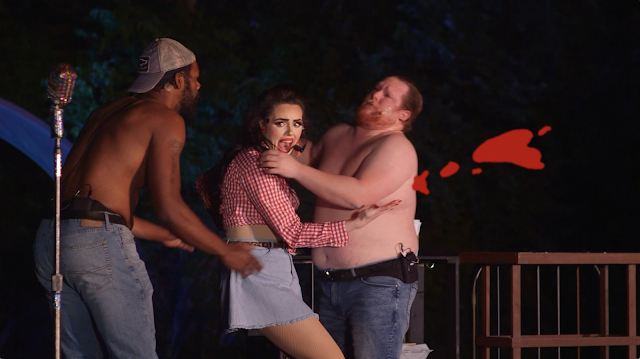Review: "Sloppy Bonnie" Sings of Starbucks, Self-Examination, and Serial Deaths
Sloppy Bonnie: A Roadkill Musical for the Modern Chick
Written by Krista Knight and Barry Brinegar
Directed by Leah Lowe
Presented by No Puppet Co. via www.sloppybonnie.com
June 21-July 15, 2021
 |
| Image courtesy Emily Owens PR |
Let me get this out of the way. Sloppy Bonnie is a show that from the start tells you it is going to be talking a lot about Southern culture. I am always skeptical when a broad swath of the country is invoked for humor’s sake, because it is often in mockery of the people who live there. The show does take a lot of cheap but also incredibly funny shots at the South, but a show in Nashville can do whatever it wants with Southern culture since the critique comes from inside. Don’t misunderstand. All the Southern clichés are there. Bonnie wears thigh-high white boots, a jean mini skirt, and a red gingham shirt tied up just under her chest. That said, it is not just a show about the South. It is actually difficult from the outset to say what Sloppy Bonnie is—a road trip story, a ghost story, a love story, or a commentary on religion and hypocrisy. It is all of these things, but it is primarily a morality tale as the narrators, Dr. Rob (James Rudolph II) and Chauncey (Curtis Reed), tell us from the start.
 |
| Image courtesy Emily Owens PR |
Bonnie’s (Amanda Disney) story opens with her, at the request of the radio hosts, defining herself as an American woman. What, they ask, is an American defined by? Her answer is that they are defined by what they buy. And for Bonnie, that is Starbucks. She moves into a song about the joys of gossiping on Sunday morning at Starbucks. She sings, “You might call me basic, but at least I fake it.” Indeed, she does fake basicness, as Bonnie is anything but simple. As she is chatting with a friend in a Starbucks, she announces that she is about to marry the man of her dreams, Jedidiah, an aspiring youth pastor. As someone who never got along with youth pastors’ indecent prudish self-righteousness, I really appreciate Jedidiah’s arc. I will just say it exposes him as having malicious motives. But Bonnie’s problem is that she can’t reach him since he has been away at a bible camp. Despite her friend’s warning, Bonnie resolves to drive out to see Jed and figure out why he has not responded to her. Clearly, Bonnie’s thesis that Americans are defined by what they buy is undercut here. As her own story tells, they are defined by what they desire.
 |
| Image courtesy Emily Owens PR |
The themes are heavy, but the story is told with much humor and music. Much of the music plays on Southern traditions, and two of the songs have fun with those oh-so Southern staples “Jesus Take the Wheel” and “The Devil Went Down to Georgia.” In this version, the devil goes down to Tennessee, which is true to the tradition of morality plays where protagonists are tempted by him. She is tempted by both Jesus and the Devil. I will not give away her choice, but when Bonnie comes out at the end to deliver the moral of the show, her answer speaks a lot not just to Southern identity but to contemporary American identity. She says her life took tragic turns not so much by the choices she made but by the fact that she did not like any of the choices on the menu. I cannot help but think of Lauren Berlant, who passed away this week, whose seminal work, Cruel Optimism, argues that much of life in late capitalism is defined by desiring things that actually keep you from your potential, thus perpetuating the fantasy of the good life. Berlant does not blame individuals who desire these things, since it is not their fault. Their menu has not been filled with other things to desire. And this is Bonnie’s story. Too many choices on the menu—Jedidiah, Jesus, the Devil, and Starbucks—but so few options for Bonnie to define and desire herself.
-Joseph Donica



Comments
Post a Comment